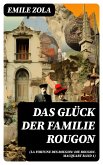In 'Die Lebensfreude' von Emile Zola wird das Leben des jungen Protagonisten Pauline detailliert dargestellt, während er versucht, seinen Platz in der Welt zu finden. Zola's literarischer Stil, der für sein naturalistisches Schreiben bekannt ist, zeigt die realistischen und manchmal brutalen Seiten des Lebens im 19. Jahrhundert. Das Buch taucht tief in die sozialen und politischen Themen der Zeit ein, während es gleichzeitig die inneren Kämpfe und moralischen Dilemmata des Protagonisten erforscht. Zola's präzise Beschreibungen und sein feines Gespür für psychologische Nuancen machen das Buch zu einem Meisterwerk der literarischen Welt.
Dieser Download kann aus rechtlichen Gründen nur mit Rechnungsadresse in A, B, BG, CY, CZ, D, DK, EW, E, FIN, F, GR, H, IRL, I, LT, L, LR, M, NL, PL, P, R, S, SLO, SK ausgeliefert werden.









